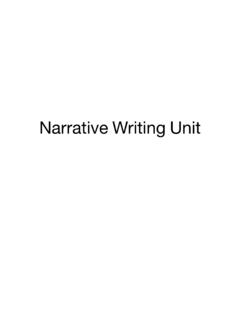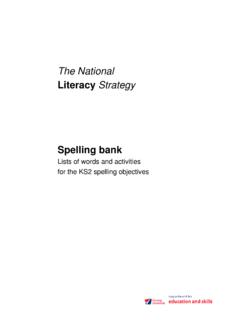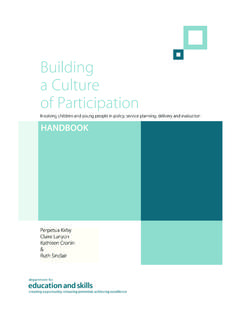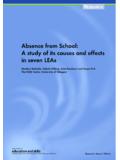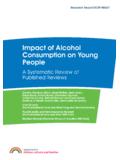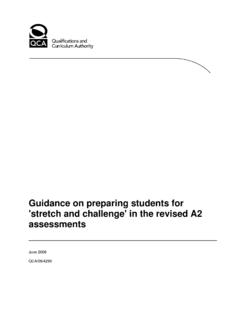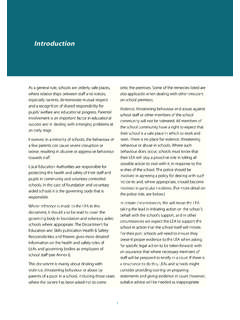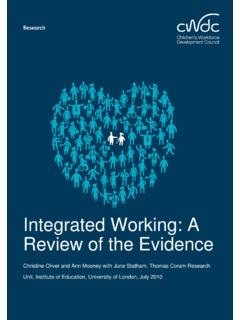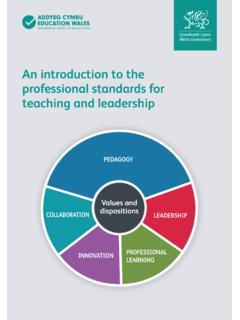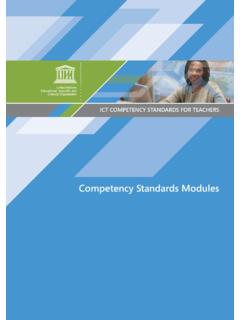Transcription of National Occupational Standards (NOS) for the …
1 National Occupational Standards (NOS) for the role of learning support practitioner in the lifelong learning sectorDRAFTDECEMBER 2007 The Sector Skills Council for lifelong learning Crown Copyright 2007 Published by Lifelong learning UKExtracts from this document may be reproduced for non-commercial research, education or training purposes on the condition that the source is 2007 CONTENTSINTRODuCTION 2 STANDARD A: learning support 4 STANDARD B: pLANNINg AND ASSESSMENT FOR learning support 10 STANDARD C: SpECIALIST learning support 13 Please note the word teacher has been used as a generic term for teachers, tutors, trainers, lecturers and instructors in the learning and skills learning uK DRAFT - DECEMBER 2007 Introducing the standardsThe National Occupational Standards (NOS) for learning support practitioners in the lifelong learning sector describe the skills, knowledge and understanding required of all those who perform a learning support role.
2 The Standards will contribute to the professionalisation of the learning support workforce and support a wider recognition of the valuable role it plays in teaching and learning . The Standards provide a benchmark for performance and will underpin professional development opportunities that recognise the developing skills of practitioners. These Standards do not apply to teachers undertaking what is may be termed learning support . Their practice should rightly be considered in relation to Standards for teachers. In addition, these Standards do not relate to the wider support workforce, for example, those providing information, advice and guidance.
3 The role of the wider support workforce is primarily concerned with supporting learners rather than learning . As such, their practice should be considered in relation to the appropriate Standards for the area they support . The role of learning support practitioner Provision of quality learning support takes place in the broad context of teaching and learning . learning support practitioners work under the direction of a person leading the learning . They contribute to the provision of learning opportunities that promote the achievement and progression of the learners they support .
4 The learner is at the heart of this all the Standards detailed here apply to all learning support practitioners. For any individual the relevant Standards are determined by the role and responsibilities undertaken. The learning support practitioner role has been detailed in The learning support practitioner role description LLUK 2007. This will provide a basis on which to define any particular role together with its responsibilities and demands in terms of knowledge, understanding and practice. Individuals may carry out a broad range of support roles which relate to other areas of specialism.
5 Where a combination of support roles is undertaken these should be underpinned by Standards taken from the appropriate specialisms. For example, those providing learning support for disabled learners may also have care responsibilities; these roles should be underpinned by a combination of the appropriate Standards from the learning support practitioner Standards and those for Care. INTRODuCTION2 LIFELONg learning uKDRAFT - DECEMBER 2007 Similarly, if a learning support practitioner is responsible for the co-ordination of others work, this aspect of the role should be underpinned by the appropriate leadership and management Standards and learning support practitioners have more responsibility than others.
6 Such practitioners have a high level of knowledge, understanding and practice related to a particular specialism. They include, for example, those who are experienced in work with disabled learners. The development of a qualification framework will support career development and progression opportunities for learning support practitioners. learning support practitioners need opportunities to progress within learning support and also into other related fields. Their career path is not necessarily into teaching, but can be into community learning and development, youth work, social work and others.
7 They can have different but equally important knowledge, understanding and practice to those leading the learning . learning support practitioners need Standards which can be combined with Standards from other specialisms to underpin professional development activities. These will provide for progression within the learning support role and/or into other related fields. Developing the Standards In 2004 the Further Education National Training Organisation (FENTO) produced a draft of the NOS for learning support . These have been reviewed and revised with reference to current and emerging contexts.
8 Practitioners, employers and stakeholders throughout the sector and across the four nations of the UK were consulted on the first draft of the Standards and confirmed the need to recognise this valuable role more widely. Respondents were clear that the provision of learning support is significant in supporting effective learning . LLUK has now developed Standards which are overarching and appropriate for all learning support practitioners, whether new or experienced, and in any context. The Standards apply to any stage of a practitioner s career. They will be used to underpin professional development for all learning uK DRAFT - DECEMBER 2007 For those learning support practitioners working under the direction of the person leading the learning who: provide learning support for individuals and/or groups work with others to provide learning support promote learner independence and self-determination promote inclusion and participation improve own practice and that of the AttributesLearning support practitioners in the lifelong learning sector value.
9 All learners, their progress and development, their potential, their learning goals and aspirations, and the experience they bring to learning learning , its potential to benefit individuals (emotionally, intellectually, socially and economically) and its contribution to the wider community and the economy learners independence and self-determination equality, diversity and inclusion in relation to learners, the workforce, and the community constructive working relationships with colleagues, groups and/or organisations to promote the progress and development of learners improving the quality of their practice through reflection, evaluation of their own practice and continuing professional A.
10 PROvIDINg learning support TO INDIvIDuALS OR g ROupS OF LEARNERS LIFELONg learning uKDRAFT - DECEMBER 2007 Knowledge and understandingLearning support practitioners know and understand:AK importance of having high expectations of learnersAK The contribution learning support can make to learners achievementAK The nature, extent and boundaries of learning support rolesAK The aims, objectives, content and approaches of the learning programmeAK How individual learning objectives are agreed with the learnerAK Ways in which learning activities can meet learner needsAK Ways of motivating and engaging learners that promote learner confidenceAK Flexible and varied approaches to learningAK Ways of working with individualsAK of working with groupsperformance CriteriaLearning support practitioners.

